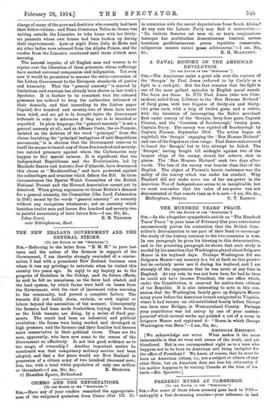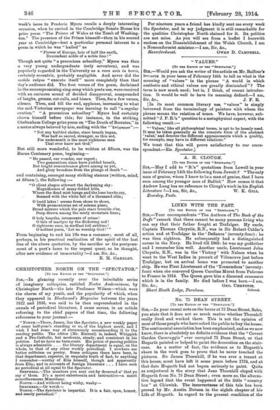FREDERIC MYERS AT CAMBRIDGE.
I To ru• Linear se emit Srscrrroa.-1
Sta,—For some of those whose memory goes back to INT- unhappily a fast-decreasing number—your reference in lash week's issue to Frederic Myers recalls a deeply interesting occasion, when he recited in the Cambridge Senate House prize poem " Tbe Prince of Wales at the Tomb of Washing- ton." The presence of the Prince himself—then in his second year at Cambridge—lent a particular personal interest to a poem in which he was " hailed" as "Flower of Europe, heir of half the earth,
Descendant noble of a noble line !"
Though not quite " a precocious schoolboy," Myers was then a very young undergraduate (only seventeen), and was popularly regarded in the University as a rara aria in terris, certainly eccentric, probably negligible. And never did the mobile vulgus " execute itself" more completely than that day's audience did. The first verses of the poem, declaimed in the uncompromising sing-song which poets use, were received with an ominous sound of decided disapproval, compounded of laughs, groans, eat-calls, and hisses. Then, fm• a few verses, silence. Then, and till the end, applause, increasing to what the mid-Victorian newspaper was learning to call "a regular ovation." "A precocious schoolboy" Myers had certainly shown himself before this; for instance, in the striking Cheltenham College prize poem on "The Death of Socrates," in a metre always beloved by him, ending with the "'Ertypanim":— "Not any bnilded shrine, since breath began,
Was half so sacred, stranger, as this sod,
For underneath is the most righteous man
That ever knew not God."
But still more wonderful, to be written at fifteen, was the Burns Centenary poem, beginning-
" He passed, our wonder, our regret ; Two generations since have yielded breath,
But bright remembrance glows among us yet,
And glory broadens from the plunge of death"— and containing, amongst many striking stanzas (written, mind, at fifteen!), the following :—
"0 silent shapes athwart the darkening sky:
Magnificence of many-folded hills,
Where the dead mist hangs and the lone hawks cry, Seamed with the white fall of a thousand rills; 0 lucid lakes ! serene from shore to shore, With promontories set of solemn pines, Broad mirrors which the pale stars tremble o'er, Deep drawn among the misty mountain lines; 0 holy hearths, intemerate of crime !
0 tale of martyrs by the flickering sod-!
0 righteous race, in stedfast toil sublime !
0 noblest poem, ' Let no worship God!'"
From beginning to end his life was a romance ; moat of all perhaps, in his practical realization of the spirit of the • last line of the above quotation, by the sacrifice or the postpone- ment of a poet's fame to the urgent quest, as he •thought, after new evidence of immortality !—I am, Sir, &c., E. AL GLKELEY.















































 Previous page
Previous page